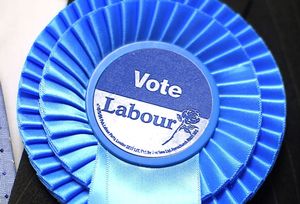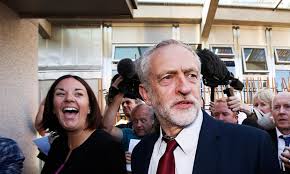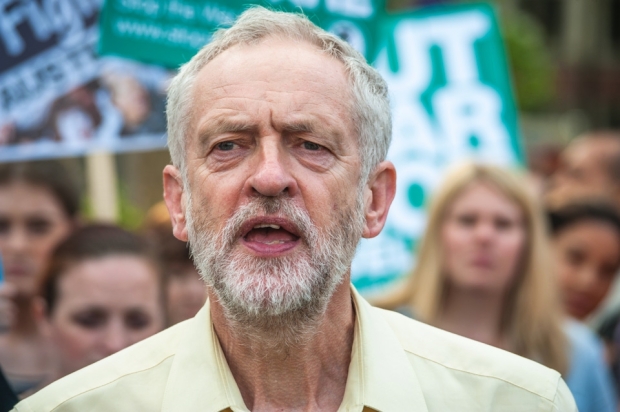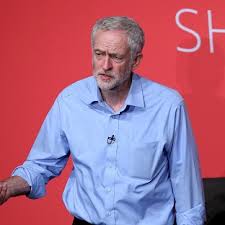
Every Sunday we’ll be asking our pool of contributors a topical question and presenting their responses, with the aim of fostering debate around an issue. This week our question is…
“Would Jeremy Corbyn winning the Labour leadership be good for Scotland?”
Of course, we’d be delighted to hear your thoughts on the issue, so please feel free to join the debate or even join our team of contributors!
Pat Wylie – I am not a Labourologist. I doubt that many, beyond a small number of party insiders, are capable of predicting how Labour might respond in any situation, especially the unexpected one of a left wing candidate seizing the party leadership. I will have a go at answering first, what might happen to Labour in the event of Corbyn becoming leader; after that it might be possible to speculate on what it means for Scotland.
Two commonly known realities about Labour are, first, that Scottish Labour is riven by factions and infighting, and second, many of Labour’s politicians, especially in London, have lost faith in socialism and are predisposed to seek the political centre ground. If Corbyn becomes leader, he will therefore need to unite the party by setting a clear political agenda, and he will need to placate or dismiss the career politicians who fear the wrath of the media and of the property-owning classes. The question is – can Corbyn achieve this without causing an immutable schism in the party?
My gut feeling is that the odds are against a Labour revival, even under a good left wing leader. The seeds of Labour’s downfall were sown in the 1980s and 90s, when the party hierarchy decided that socialism was a dirty word. Achieving unity between the party’s different factions has never been easy, but it is harder in an increasingly divided party which seeks to govern a society riven by both poverty and pockets of extreme wealth. In millennial Britain, it can feel as if there is no centre ground, such is the prevalence of inequality. A euphoric process of renewal is required to rejuvenate Labour, and the country; there might be high profile resignations and defections by some within Labour to other parties, but this is what Labour needs if it is to avoid the same ultimate fate as the Lib Dems.
So what would a Corbyn victory mean for Scotland? I will try not to use the terms ‘Scotland’ and ‘the left’ interchangeably, though as a left wing Scot I do conflate the two at times. I think that a Corbyn victory would be good for the left: it would be good for the equality project, and it would certainly give hope to millions of us, particularly those who experience poverty or who know and care about those who do.
In Scotland, the cause of independence was championed by the left, especially since 2010; just as the case for devolution once was. A resurgence of the left in England, symbolised by but not limited to Corbyn becoming Labour leader, should give the left in Scotland, and the independence movement, pause for thought. I am a lefty first and a Scot second, therefore I would rest my desire to see an independent Scotland if I saw a true, root-and-branch reform of politics down south. I don’t see it just yet, but a reformed, left-leaning Labour party would represent an important step towards a Britain I could believe in.
Siobhan Tolland – I cannot see how Corbyn can have any negative effect on Scotland. Any leader of a political party within the UK who has a humanitarian approach can only have a positive effect for those who are vulnerable, whether that be Scottish or English. And an anti-austerity approach can only be good.
Corbyn’s potential success needs to be seen in a short and long-term basis, because his impact on Scotland is likely to be different at different points of our political future.
In the short term, over the next course of parliament, it would be very feasible for the SNP to create a positive working opposition with labour against the Conservatives and the austerity agenda. The SNP and Labour would have more than enough in common to create that. In addition to this, what we are witnessing, through Corbyn, is the beginnings of a mass movement that is based on similar ideals to the Independence movement in Scotland. An enshrining of a welfare state, an end to austerity, a commitment to a nuclear free future and a rethinking of our current global aggression.
I think it is recognised (within Scotland anyway) that Scotland is a separate nation, with a separate identity and now a distinctly separate political culture. Any relationship between Scotland’s progressive movement and the English one developing would not be considered as a UK-wide movement but as a coalition of movements between Scotland and England. As a healthy, progressive partnership. That is very possible.
In the short-term then, a good working relationship with Labour would be beneficial for Scotland as well as our English and Welsh neighbours because we would be fighting against the right wing agenda. Whether Corbyn wins the leadership or not, I see that movement still existing and working with the Scottish progressives.
Where the difficulty might be in this is the Labour Party’s vicious Unionist baggage. The Labour Party sought to undermine, destroy and vilify a progressive movement that was and is articulated through a discourse of self-determination. Corbyn’s most recent statement on Scottish independence is his preference to keep the ‘autonomy’ we have now. Clearly this is not enough for most Scots. However, I believe, through Corbyn, we would have a more constructive debate with Labour on the issue of independence. Corbyn’s reiteration of a discussion of issues over name calling allows for this, regardless of politics.
Under Corbyn, the Labour party would be initiating a political clean slate. Corbyn would have to start again with Scotland. In my opinion, he would need to extend a hand of friendship and offer an apology to Scotland for Labour working with the Tories against us, vilifying us and deliberately obstructing a progressive movement within Scotland.
That act, in my opinion, would allow us to initiate our own clean slate in how we work with Labour. Even three months ago I would have seen any working relationship with Labour as impossible. However Corbyn, and the movement gathering around him, does initiate a new chapter in English progressive politics. As a similar movement in Scotland, we have to recognise this and allow some forgiveness so we can work together against the onslaught of right wing ideology. Against that struggle, at this moment, dividing politics into Unionist and Pro-Independence would be ignoring the urgent issues at hand.
In the medium to longer-term, however, we do need to negotiate the issue of independence. Because an independence referendum is inevitable, the only real question is when. Corbyn’s belief in our right to hold this is immediately better than the position we are in now, where Cameron dismisses the possibility of it.
Labour’s relationship to the next referendum is key. I think it would be clear that Corbyn’s Labour is unlikely to support independence, which is a shame but probably the reality. The best we might hope for would be either a neutral position or a position of Devo max (proper devo max not the perniciously anaemic one we have been given). Under Corbyn, we can safely assume that Labour would never work with the Tories again, however. They would likely be mounting their own campaign.
What they would be able to provide, however, would be a positive vision of a United Kingdom. That does seem strange even as I write this, but Corbyn’s positive vision for Labour could be easily transferred into a Unionist argument. This would be even more the case if they won the 2020 election on a Corbynist platform.
At the same time the reason for the aggressive pro-Unionist campaign was because of a strong Neo-liberalist politics that needed oil to shore up a financially bankrupt UK. Corbyn challenges that, along with the notions of Empire, power and racial superiority. So, effectively, the right wing defence of the Union could be fragmented. A healthy, fair and equal economy and society in England might reduce the desperate need to stand in the way of Scotland’s departure. A labour victory may increase the fragmentation of the Neo-Liberal Unionist discourse.
Whether we vote for Independence under these circumstances remains to be seen. For my personal perspective, I am not a nationalist and independence, for me, is not the be all and end all for us going forward. I became involved in YES because I saw it as the only way we could build a progressive society.
If that progressive society is possible within the UK, does that change my opinion? Surprisingly it doesn’t. I think Scotland has reached a point where self-determination seems inevitable. I think it is the genuinely healthy option for us regardless of what is happening in England. It might just mean the divorce is less acrimonious. It would also mean a much more healthy and productive relationship with our English and Welsh friends.
Anna Crow – I feel that it is very important to look beyond political party affiliation alone and seek a deeper sense of someone’s values and what they stand for as a person. Jeremy Corbyn’s words and actions including his response to the new government’s budget, his long-term voting record, decades of activist involvement and his very minimal expenses claims stand up well to this scrutiny.
Many of us recognise the common values and beliefs we share with Jeremy Corbyn. We can see that he is no superficially charismatic career politician surrounded by a team of focus groups and spin doctors. He does not strike any of us as someone who is on a campaign to impress the public for his own political power gains. It is the evidence of his unwavering principled values that impress us.
He is someone who does not conform to the tribalistic mentality that is so dominant in politics; someone who votes based on his own values and beliefs with consideration for his own constituents rather than doing what the party whips will try to tell him to do. We need more elected members of government like this, those who are open to working productively with those from other groups but will take a clear stand on important areas of disagreement.
I believe there is the potential for significant and positive change in UK politics with Jeremy Corbyn as Labour party leader. If there is any hope of the deep-seated problems within the Labour party getting sorted out he is the best person to be at the helm to address this productively. There is also much needing to be done in creating an ethos of better communication and cooperation between different parties, particularly between Labour and the SNP, with a focus on the common good for the people of Scotland and the rest of the UK.
I do not see him as someone who would block a second independence referendum, were he given the opportunity. If anything, in that situation a much more well-rounded, honest and positive case for remaining within the union may be presented – enabling a more informed and democratic decision to be made by the people of Scotland.
I therefore believe election of Jeremy Corbyn as Labour party leader is in the best interests of Scotland.
Christopher Napier – Corbyn winning the Labour leadership will do one of two things.
He will either revitalise Labour – and the left as a whole – as a genuine opposition to the Conservative government and the neoliberal consensus OR he will be fail to do so, whether that’s by being brought down by internal forces or badly beaten at the ballot box.
If he revitalises Labour and either wins the 2020 election or regains a significant amount of ground against the Conservatives, he could initiate some genuine progressive change in the UK (or at least drive the conversation in that direction) which would make things better in Scotland and potentially deflate much of the case for independence – after all, if we can have a more equalitarian, progressive country without the turmoil and uncertainty of separation, then why bother?
If he fails, then Labour are effectively done as a progressive force, we’re doomed to a generation of Conservative rule and that is undoubtedly A Bad Thing. However, the failings of the UK establishment and having right wing governments imposed by corporate interests and the English shires will be laid bare for all to see, we’ll start to see the mid-term effects of austerity in the stagnating economy and the case for independence will be made conclusively – whether Westminster approves or not.
Some folks might be wary of Corbyn’s unionist stance, but this is to be expected from an old-school English socialist and his commitment to progressive values and democracy make him a far more appealing partner or at worst a far more constructive and reasonable opponent for proponents of independence.
Effectively, a Corbyn win is an accelerator which will either improve the political balance in the UK or make it undeniably clear that such balance cannot be achieved and both scenarios are in the long term, good for Scotland.
WHAT DO YOU THINK?
_________________________
If you like what you read please check out some of our other articles and if you don’t like what you read please give your own perspective and contribute! As a new venture we are always looking for talented writers with something to say about Scots politics and culture and if you have never written before, give it a try. Please contact scotsperspective@gmail.com or message our Facebook page.






